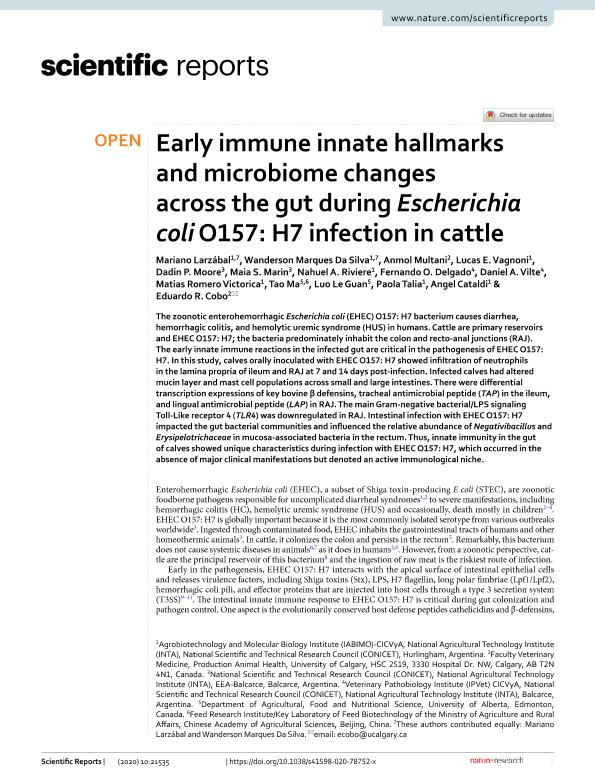Artículo
Early immune innate hallmarks and microbiome changes across the gut during Escherichia coli O157: H7 infection in cattle
Larzabal, Mariano ; Marques Da Silva, Wanderson
; Marques Da Silva, Wanderson ; Multani, Anmol; Vagnoni, Lucas Emilio; Moore, Dadin Prando
; Multani, Anmol; Vagnoni, Lucas Emilio; Moore, Dadin Prando ; Marin, Maia Solange
; Marin, Maia Solange ; Riviere, Nahuel Agustín
; Riviere, Nahuel Agustín ; Delgado, Fernando Oscar; Vilte, Daniel Alejandro; Romero Victorica, Matias
; Delgado, Fernando Oscar; Vilte, Daniel Alejandro; Romero Victorica, Matias ; Ma, Tao; Le Guan, Luo; Talia, Paola Monica
; Ma, Tao; Le Guan, Luo; Talia, Paola Monica ; Cataldi, Angel Adrian
; Cataldi, Angel Adrian ; Cobo, Eduardo R.
; Cobo, Eduardo R.
 ; Marques Da Silva, Wanderson
; Marques Da Silva, Wanderson ; Multani, Anmol; Vagnoni, Lucas Emilio; Moore, Dadin Prando
; Multani, Anmol; Vagnoni, Lucas Emilio; Moore, Dadin Prando ; Marin, Maia Solange
; Marin, Maia Solange ; Riviere, Nahuel Agustín
; Riviere, Nahuel Agustín ; Delgado, Fernando Oscar; Vilte, Daniel Alejandro; Romero Victorica, Matias
; Delgado, Fernando Oscar; Vilte, Daniel Alejandro; Romero Victorica, Matias ; Ma, Tao; Le Guan, Luo; Talia, Paola Monica
; Ma, Tao; Le Guan, Luo; Talia, Paola Monica ; Cataldi, Angel Adrian
; Cataldi, Angel Adrian ; Cobo, Eduardo R.
; Cobo, Eduardo R.
Fecha de publicación:
12/2020
Editorial:
Nature
Revista:
Scientific Reports
ISSN:
2045-2322
Idioma:
Inglés
Tipo de recurso:
Artículo publicado
Clasificación temática:
Resumen
The zoonotic enterohemorrhagic Escherichia coli (EHEC) O157: H7 bacterium causes diarrhea, hemorrhagic colitis, and hemolytic uremic syndrome (HUS) in humans. Cattle are primary reservoirs and EHEC O157: H7; the bacteria predominately inhabit the colon and recto-anal junctions (RAJ). The early innate immune reactions in the infected gut are critical in the pathogenesis of EHEC O157: H7. In this study, calves orally inoculated with EHEC O157: H7 showed infiltration of neutrophils in the lamina propria of ileum and RAJ at 7 and 14 days post-infection. Infected calves had altered mucin layer and mast cell populations across small and large intestines. There were differential transcription expressions of key bovine β defensins, tracheal antimicrobial peptide (TAP) in the ileum, and lingual antimicrobial peptide (LAP) in RAJ. The main Gram-negative bacterial/LPS signaling Toll-Like receptor 4 (TLR4) was downregulated in RAJ. Intestinal infection with EHEC O157: H7 impacted the gut bacterial communities and influenced the relative abundance of Negativibacillus and Erysipelotrichaceae in mucosa-associated bacteria in the rectum. Thus, innate immunity in the gut of calves showed unique characteristics during infection with EHEC O157: H7, which occurred in the absence of major clinical manifestations but denoted an active immunological niche.
Archivos asociados
Licencia
Identificadores
Colecciones
Articulos (IABIMO)
Articulos de INSTITUTO DE AGROBIOTECNOLOGIA Y BIOLOGIA MOLECULAR
Articulos de INSTITUTO DE AGROBIOTECNOLOGIA Y BIOLOGIA MOLECULAR
Citación
Larzabal, Mariano; Marques Da Silva, Wanderson; Multani, Anmol; Vagnoni, Lucas Emilio; Moore, Dadin Prando; et al.; Early immune innate hallmarks and microbiome changes across the gut during Escherichia coli O157: H7 infection in cattle; Nature; Scientific Reports; 10; 1; 12-2020; 1-15
Compartir
Altmétricas



